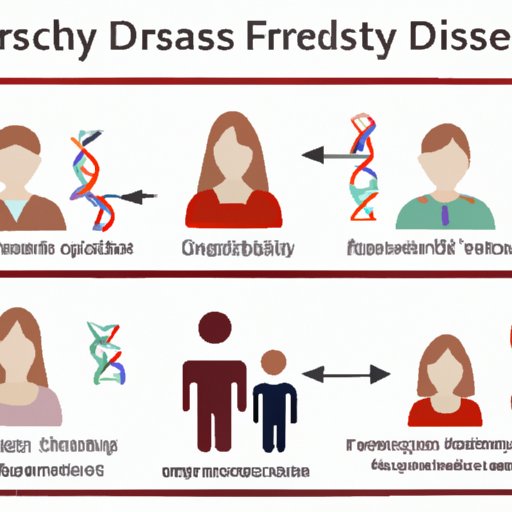
I. Introduction
Hereditary diseases, also known as genetic disorders, are inherited conditions that result from abnormal changes or mutations in our DNA. These conditions can have a significant impact on an individual’s health and quality of life. In this article, we will explain the basics of hereditary diseases, discuss the impact on families, highlight recent advances in research, and share personal stories to raise awareness and support efforts to find better treatments and cures for these conditions.
II. Explaining the Basics
Hereditary diseases can be inherited in different patterns, including autosomal dominant, autosomal recessive, X-linked dominant, and X-linked recessive. Autosomal dominant conditions require only one abnormal gene (inherited from one parent) to cause the disease, while autosomal recessive conditions require two abnormal genes (inherited from both parents). X-linked conditions are caused by mutations on the X chromosome and may affect males more severely than females.
Genes carry the instructions for making specific proteins that perform various functions in the body. Abnormal genes can lead to the production of faulty or missing proteins, which can cause a wide range of health problems. Some genes are more commonly associated with hereditary diseases, such as the BRCA1 and BRCA2 genes, which increase the risk of breast and ovarian cancer.
Hereditary diseases are more common than many people realize. According to the National Institutes of Health (NIH), about 1 in 4 people in the United States has some form of hereditary condition. It is essential to know one’s family medical history to identify potential risks and take preventive measures before symptoms appear.
III. Focusing on a Specific Disease
Let’s take a closer look at one specific hereditary disease to understand how it can impact individuals and families.
Cystic Fibrosis
Cystic fibrosis (CF) is a genetic disorder that affects the lungs, pancreas, and digestive system. CF causes the production of thick, sticky mucus that can clog the lungs and obstruct the pancreas, leading to breathing difficulties, recurrent lung infections, poor growth, and malnutrition.
CF is caused by mutations in the CFTR gene, which provides instructions for making a protein that regulates the movement of salt and water in and out of cells. The mutations impair the function of the CFTR protein, leading to the buildup of thick mucus in various organs.
CF is usually diagnosed in early childhood, but some individuals may not receive a diagnosis until later in life. Testing for CF can include sweat tests, genetic testing, and imaging studies. There is currently no cure for CF, but treatment options aim to manage symptoms and prevent complications. These may include antibiotics, airway clearance techniques, and nutritional support.
IV. Discussing the Impact on Families
A hereditary disease can have significant emotional, physical, and financial impacts on affected families. Families may experience feelings of guilt, fear, and isolation as they navigate the challenges of living with a chronic condition. The financial impact can also be significant, as families may face high medical expenses, lost income, and other costs related to caregiving and support.
Support options are available to families affected by hereditary diseases, including counseling, support groups, and financial assistance. Families can also take steps to cope with the diagnosis by staying informed, building a strong support network, and seeking professional help when needed.
V. Highlighting Recent Advances
Despite the challenges associated with hereditary diseases, there is reason for hope. In recent years, there have been significant breakthroughs in research that have led to new treatments and therapies for some genetic disorders.
For example, gene therapy is a promising area of research that involves replacing or repairing abnormal genes to restore normal function. This technique has shown considerable success in treating some hereditary conditions, such as spinal muscular atrophy and inherited blindness.
VI. Sharing Personal Stories
Personal stories can provide a powerful way to raise awareness about hereditary diseases and inspire support for impacted families. Here is an interview with an individual with CF, who shares her personal experience with the condition:
Q: Can you share a bit about your experience with CF?
A: I was diagnosed with CF when I was a baby, so it’s always been a part of my life. Growing up, I had to do daily treatments to help clear my lungs and keep me healthy. It wasn’t easy, but I was lucky to have a supportive family and medical team. As I’ve gotten older, I’ve had more complications, but I try to stay positive and focus on what I can do to improve my health.
Q: What would you like people to know about CF?
A: CF is a challenging condition, but it doesn’t define who I am. There are many misconceptions about what it’s like to live with CF, but I hope people will take the time to learn more about it and support research efforts to find new treatments and a cure.
VII. Conclusion
Hereditary diseases can have a significant impact on individuals, families, and society as a whole. Understanding the basics of how these conditions are inherited and the impact they can have is essential to finding new treatments and cures. By sharing personal stories, raising awareness, and supporting research, we can make progress towards a future where hereditary diseases are a thing of the past. Remember to know your family medical history and take steps to prevent and manage potential risks.




